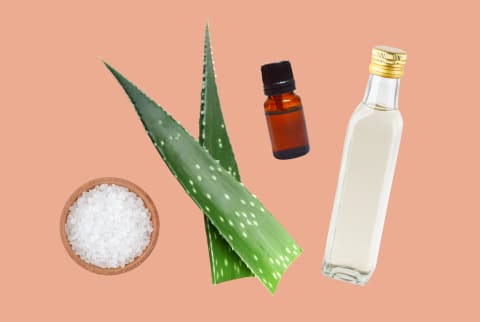Advertisement
4 Doctor-Approved Remedies For Your Most Common Summer Health Woes


Summer is officially here, along with plenty of fun outdoor activities: hikes, camping, beach trips, pool days. But summer also brings with it quite a few unique health woes. As an integrative physician, I've worked with loads of people over the past decade who have come in with minor conditions like sunburns, bug bites, and jellyfish stings. The good news: Many of these can be addressed at home with a few simple, DIY treatments and no need for a doctor's visit.
Here, I share my top four natural remedies that are essential for any summer first-aid kit.
Neutralize jellyfish stings with vinegar.
Nothing ruins a beach day faster than a bad jellyfish sting. Jellyfish are often in shallow ocean water and hard to see. When they sting, they leave little venomous barbs called nematocysts in your skin. Nematocysts continue releasing venom even after they've been released by the jellyfish into your skin, which can make jellyfish stings hurt for several minutes (or hours, in some cases).
Fortunately, it's easy to neutralize jellyfish venom. Any weak acid will interfere with the jellyfish stingers' chemistry, preventing them from firing more venom into your skin.
Next time you go to the beach, bring a small bottle of vinegar with you for jellyfish stings. If you or your child gets stung, rinse the sting with vinegar to stop the stingers from releasing more venom. Don't rub or ice the area, as this can drive the barbs farther into your skin. Instead of scraping or rubbing, try to remove individual barbs with tweezers, using more vinegar if needed.
Use Epsom salt as a natural sunburn remedy.
Direct sunlight isn't all bad—a small amount of sunlight every day1 is actually good for you. Light sun exposure is an excellent way to increase your vitamin D levels2 and balance your hormones.
It's a balancing act, though, because while light sun exposure is great for you, too much sun can lead to sunburn, which increases your risk of skin cancer2. You want to get a few minutes of direct sunlight, then put on a good natural sunscreen to protect yourself.
If you do happen to end up with a sunburn (it happens to the best of us!), Epsom salt is an easy way to manage it. To relieve your red, inflamed skin, simply dissolve 1 or 2 cups of Epsom salt in a bath and soak the parts of your skin that are sunburned. No bathtub? Soak a washcloth in warm water with Epsom salts, place the cloth on your skin for several minutes, then rinse. Epsom salt is mostly magnesium, which decreases skin inflammation3 and helps hydrate dry or damaged skin. In fact, you can use Epsom salt to relieve most types of minor skin irritation, including eczema and poison ivy.
Relieve bug bites and disinfect cuts with lavender oil.
Lavender essential oil is a simple way to calm itchy bug bites. Lavender oil is a gentle anti-inflammatory that decreases acute swelling4, which makes it perfect for relieving mosquito bites or bee stings. A couple of drops of lavender essential oil can be applied directly to bug bites via a cotton ball. You can also use lavender essential oil for minor cuts and scrapes. Lavender oil is a natural antimicrobial5, largely thanks to an aromatic compound called linalool6. You can mix equal parts lavender oil and a carrier oil (jojoba and sweet almond oil are two of my favorites) and rub the blend on scrapes and cuts to disinfect them.
Use aloe vera as your all-purpose summer skin salve.
Aloe vera is great for skin care throughout the summer, especially on pool days. Aloe is a rich source of skin-shielding antioxidants, vitamins, and minerals, and it protects your skin7 in a few different ways:
- Sunburn protection. After aloe is applied, it generates an antioxidant protein called metallothionein in the skin, which helps protect your skin from UV radiation.
- Skin hydration/anti-aging. Aloe stimulates collagen and elastin production, which decreases wrinkles and keeps skin hydrated. Aloe also contains mucopolysaccharides that bind moisture to your skin.
- Redness and inflammation. Aloe is rich in magnesium and a variety of antioxidants that reduce inflammation and redness. Its anti-inflammatory action can also help reduce itching and redness associated with poison ivy.
Do yourself a favor and rub aloe on your skin after a pool day to prevent dryness and itching from harsh pool chemicals, and apply it (after your Epsom salt bath!) liberally to help soothe sunburns. You can buy organic aloe vera gel, or you can grow an aloe plant yourself and cut off a leaf when you need it. The leaf will release fresh aloe gel, which you can then use topically.

Dr. Taz Bhatia is a board-certified physician, specializing in integrative and emergency medicine, pediatrics and prevention, with expertise in women’s health, weight-loss, hormone balance and nutrition. She attended Emory University, the University of Georgia and the Medical College of Georgia, and was a recipient of the Emily Gardner Award for Best Pediatric Resident in 2000. She is the author of the Superwoman RX and The 21-Day Belly Fix. Personal health challenges in her twenties combined with a broken health care system motivated Bhatia to pursue an alternative definition of health and healthy living. As a young resident, she was sick and without answers, and began searching for help to heal her health issues. Studying various systems of medicine including Chinese Medicine, Acupuncture and Ayurveda, she found a wealth of information not yet taught in conventional medical schools. It led her to opening her now nationally-recognized practice, CentreSpring MD (formerly Atlanta Center for Holistic and Integrative Medicine). Today, Bhatia and her team work relentlessly to find a patient’s core health problems, their centre, in order to spring them forth in health, pulling from multiple systems of medicine, including integrative, functional, Chinese and holistic medicine.
More from the author:
Functional Nutrition Training
Check out Functional Nutrition Coaching
A cutting-edge nutrition deep dive taught by 20+ top health & wellness experts
Learn moreMore from the author:
Functional Nutrition Training
Check out Functional Nutrition Coaching
A cutting-edge nutrition deep dive taught by 20+ top health & wellness experts
Learn more
Dr. Taz Bhatia is a board-certified physician, specializing in integrative and emergency medicine, pediatrics and prevention, with expertise in women’s health, weight-loss, hormone balance and nutrition. She attended Emory University, the University of Georgia and the Medical College of Georgia, and was a recipient of the Emily Gardner Award for Best Pediatric Resident in 2000. She is the author of the Superwoman RX and The 21-Day Belly Fix. Personal health challenges in her twenties combined with a broken health care system motivated Bhatia to pursue an alternative definition of health and healthy living. As a young resident, she was sick and without answers, and began searching for help to heal her health issues. Studying various systems of medicine including Chinese Medicine, Acupuncture and Ayurveda, she found a wealth of information not yet taught in conventional medical schools. It led her to opening her now nationally-recognized practice, CentreSpring MD (formerly Atlanta Center for Holistic and Integrative Medicine). Today, Bhatia and her team work relentlessly to find a patient’s core health problems, their centre, in order to spring them forth in health, pulling from multiple systems of medicine, including integrative, functional, Chinese and holistic medicine.
7 Sources
- https://www.ncbi.nlm.nih.gov/pmc/articles/PMC2290997/
- https://www.ncbi.nlm.nih.gov/pmc/articles/PMC3897598/
- https://www.ncbi.nlm.nih.gov/pmc/articles/PMC3884513/
- https://www.ncbi.nlm.nih.gov/pubmed/29743918
- https://www.ncbi.nlm.nih.gov/pubmed/12112282
- https://www.ncbi.nlm.nih.gov/pubmed/26553262
- https://www.ncbi.nlm.nih.gov/pmc/articles/PMC2763764/

















